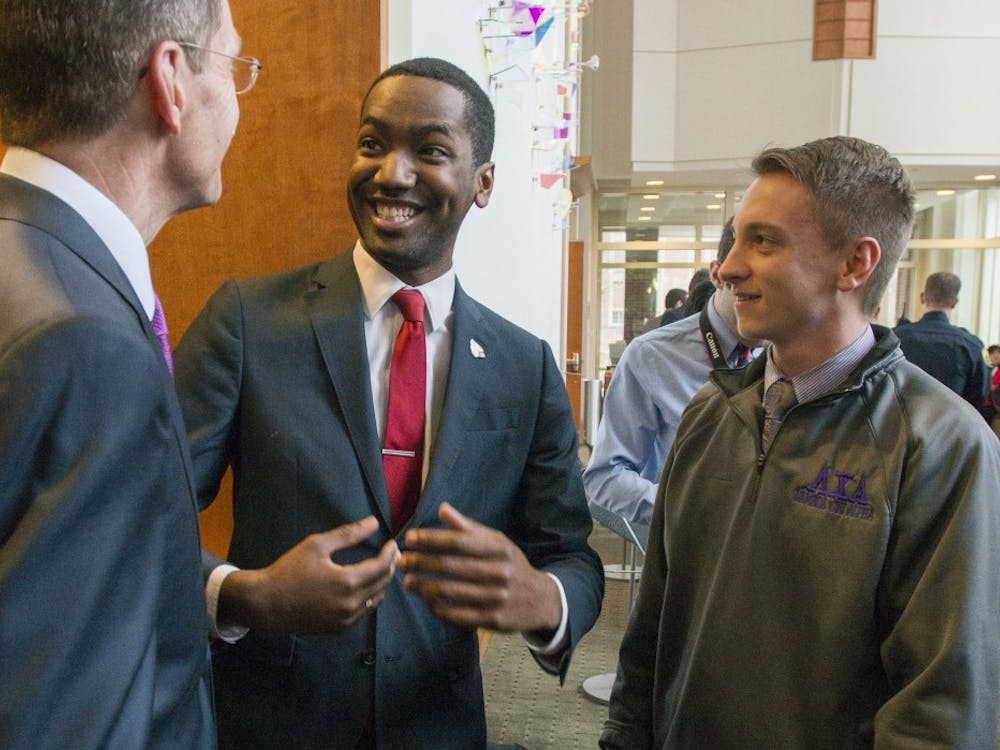Brandon Brown, a sophomore, received a littering ticket in late August from an University Police Department officer. The ticket was $25 for flicking his cigarette butt on the ground, but he paid $143.
Here’s a look at how he paid nearly six times the cost of the littering fine.
City costs: $17.50
City judicial salaries: $5
Document storage fee: $2
Continuing education fund: $4
State costs: $38.50
Delaware County costs: $14
Jury fee: $2
Public defense administration fee: $5
Judicial insurance fee: $1
Court administration fee: $5
Automated record keeping: $7
DNA sample processing fee: $2
State judicial salaries: $15
Infraction fines: $25
Source: Staff reports
Ball State’s smoking policy is the strictest for Indiana public universities with on-campus residences, next to IUPUI, and student smokers are not the only ones complaining.
Indiana University has a similar policy, but the main campus allows smoking in a few provost-designated smoking areas. At the IUPUI campus, the mostly commuter college has a complete smoking ban.
Joan Todd, Ball State executive director of public relations, said administrators considered a study by Americans for Nonsmokers’ Rights, which cites more than 1,200 schools in the country with similar policies.
Kay Bales, vice president for student affairs, said in an email sent by Todd that Ball State does not plan on lessening the severity of the tobacco-free policy.
“We recognize that this has been an adjustment for smokers, but [we] feel the benefits outweigh the inconvenience,” she said.
Students have to smoke off campus or they could face a $100 smoking violation fine. Gene Burton, director of public safety, said the University Police Department has issued two warning violations, but no students have been fined for the violation.
“Our goal isn’t to hand out tickets — it’s to enhance the health and well-being of our campus community,” Bales said in the email. “As the campus becomes more familiar with the new policy, the need for reminders will diminish.”
Three people have received littering tickets for cigarette butts — a $25 ticket that becomes a $143 fine after fees.
Many issues have come from the unofficial smoking section on Petty Avenue, where six residences have complained about smokers obstructing traffic.
Burton said it has become an issue of public safety. Officers are often parked in patrol cars to monitor the smoking area.
NEIGHBORHOOD, SMOKER COMPLAINTS
Nearby residents have complained about smokers who step into adjacent neighborhoods to light up.
The university has asked students and employees to avoid going into neighborhoods to smoke and has put out trash cans to steer smokers to areas where they won’t be a nuisance. Bales said the trash cans are an effort to help keep residents happy and problem areas cleaner. She said the university’s grounds crews also clean the area daily.
According to documents from a public records request, Ball State has received six complaints letters from residents who live near campus.
Besides Petty Avenue, people have complained about smokers in other areas near the Westridge neighborhood, including Warwick Road, near the David Owsley Museum of Art.
“I walk back and forth to work this way every day and have to pass by smokers almost every time,” Eric Hedin, Ball State assistant professor and Westridge Neighborhood Association board president wrote to Ball State officials. “It feels like a violation of our privacy. It used to be that our road, although close to BSU, got very little pedestrian traffic. Now, it feels like BSU’s presence, and the smokers are the worst sort of presence, is coming up the road into our residential district.”
Some of the complaints request signs to deter students from smoking so close to residents’ properties and to reduce littering. Some residents have already put up signs.
Residents David Land and Pete Drumm sent a letter to Hedin to inform the neighborhood board that they will request Ball State put up a permanent barrier near their properties to solve the problem, despite the inconvenience it might serve to neighbors who cut through their driveway.
“Since, the start of the 2013-2014 academic year on Aug. 19, we have seen an increase in the students, staff and other individuals who have stepped on our property to smoke,” the letter stated. “Even worse, we have been rudely addressed when asking students to refrain from smoking on our private property and even refusing to leave when requested to do so.”
Many students, regardless of if they smoke, said they recognize the problems a ban has caused.
“I think it’s a waste of both the students’ and the law enforcers’ [time], because both groups have more important things to worry about,” Brandon Brown, a sophomore sociology major, said.
Senior Emily Clarkson lives just off campus and has some sympathy for those trying to avoid tobacco tickets. She and her roommates allow smokers to use their backyard.
“I think [the smoking ban] was a nice idea in theory,” she said. “But in practicality, it just caused more problems.”
COMPARED TO OTHER CAMPUSES
The type of limited smoking ban formerly used at Ball State is similar to what is followed at Indiana University and the state’s other public colleges. Some of them also point to a state law that bans smoking near doorways when it comes to enforcement.
The Bloomington, Ind., campus has not had complaints about people trespassing on nearby property, said Lt. Craig Munroe of IU’s police department. But he said he doubts that smokers there are ready for a complete ban.
“We’re going through a transition period, no doubt,” he said.
Purdue University has designated smoking areas, but the university has moved some of them farther away from buildings, said Carol Shelby, senior director of environmental health and public safety. She has heard one complaint since school began in August. She said the policy relies on peer-to-peer enforcement.
The University of Southern Indiana in Evansville says it has a tobacco-free campus, but it allows smoking in designated areas. Stephen Woodall, USI director of public safety, said the policy wasn’t designed so campus security becomes “the tobacco police.”
At Indiana State University in Terre Haute, police chief William Mercier said smoking areas may seem convenient for students but are not a solution to the problem of secondhand smoke.
“It centralizes the smoking in a couple of areas, and they can be pretty nasty,” Mercier said. “It’s kind of defeating the purpose. The idea that you’re smoke free, but there’s these areas where you can smoke is kind of counterintuitive.”
Cutting tobacco use through bans will take time, he predicted.
“It’s going to be a process, just as it is off campus in commercial establishments,” he said.
“I think that the state ordinances about smoking in bars were pretty controversial, and they seem to have calmed down quite a bit. I think, eventually, the same will happen at universities.”
Steven Williams and Katye Snyder contributed to this story.





